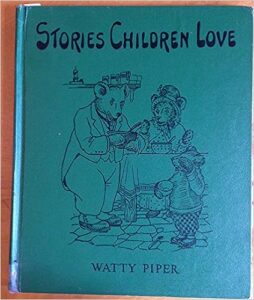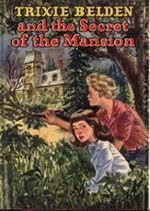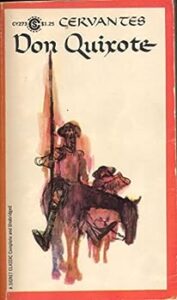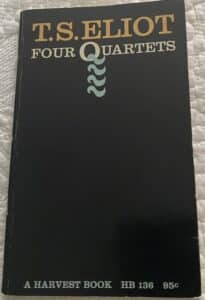I still have the first poetry book I ever bought, Four Quartets by T.S. Eliot.
My mother was a great one for reading aloud to her young children. Some of my earliest memories (notwithstanding putting the dog in the oven or pouring shoe polish on the sofa) are of my mother reading to me. I learned many Mother Goose nursery rhymes sitting next to her on the (repaired) sofa. Story time involved a big green book entitled Stories Children Love by Watty Piper, first published in the 1920s with the kinds of illustrations popular for children at the time.
 I still have that book. I loved the stories filled with big bad wolves, evil stepmothers, giants, and ogres. The binding is now wearing thin, but it’s still intact. You can find the listing on Amazon, but it’s “currently unavailable.”
I still have that book. I loved the stories filled with big bad wolves, evil stepmothers, giants, and ogres. The binding is now wearing thin, but it’s still intact. You can find the listing on Amazon, but it’s “currently unavailable.”
I was the middle child, with fairly large gaps between me and my two brothers. Mother read to all three of us, but for whatever reason, I turned out to be the major reader in the family. That became a lifelong habit, and I give full credit to my mother for instilling a love of reading and books in me.
I was buying my own books by age 7; the TG&Y dime store was a mile-and-a-half bike ride from my house. (And, yes, I often biked alone, and we’d never heard of bike helmets.) My first-purchased book was Trixie Belden and the Secret of the Mansion. By the next year, I was on to the Hardy Boys. I read my first Agatha Christie mystery in fifth grade. One of my favorite parts of school was the monthly order with Scholastic Book Club; my mother encouraged my reading, but she put a limit on how much I could spend.
 By middle school (we called it junior high), my reading was changing. I still liked mysteries. But my reading was growing more serious, reflecting assignments in my English and literature classes. A Tale of Two Cities and The Old Man and the Sea were highlights of eighth grade, and I first encountered two of my all-time favorite books in ninth grade (Great Expectations and David Copperfield). What poetry I read was what was assigned in textbooks, until my senior year in high school.
By middle school (we called it junior high), my reading was changing. I still liked mysteries. But my reading was growing more serious, reflecting assignments in my English and literature classes. A Tale of Two Cities and The Old Man and the Sea were highlights of eighth grade, and I first encountered two of my all-time favorite books in ninth grade (Great Expectations and David Copperfield). What poetry I read was what was assigned in textbooks, until my senior year in high school.
I’d driven to Lakeside Shopping Center in suburban New Orleans to buy a book assigned in senior English — Don Quixote by Miguel de Cervantes. We could read either the abridged version or the complete text; I was one of two in my class of 30 boys who wanted to read the whole thing. By this time, I was a serious reader; no abridged version for me!
The bookstore was called Dolphin Book Shop. It was a small, quiet store, known for an emphasis on classic literature. I quickly found Don Quixote (the Signet paperback edition), and then I browsed. For reasons unknown, I found myself browsing poetry. And there, on an eye-level shelf, sat a slim volume of Four Quartets by T.S. Eliot.

The Don Quixote paperback was traded in long ago for a hardback edition, but I still have that little paperback edition of Four Quartets. It might have been my impressionable age, but it left a lasting mark in my mind. It also traveled with me. It went to college at LSU, it rode in my back seat to my first job at the Beaumont, Texas newspaper, it traveled with me and my wife to Houston and the three places we lived there, and it continued its journey with me to St. Louis.

I own at least two hardcover editions of Eliot’s poetry, both of which include the full texts of Four Quartets. I don’t really need that little paperback that’s now more than 50 years old. And yet, I do. It reminds me of a bookstore I loved. It’s a signpost, and likely the first, of a lifelong enchantment with Eliot’s poetry. It ties a high school boy’s experience to that of an aging man sitting in the British Library 46 years later. It also tells me that some things do last, like a love for poetry.
I look at one note I wrote in that book in 1969, referring to a line in “The Dry Salvages”: “Is the sea the edge of the land, or is the land the edge of the sea?” I can’t help but smile.
Photo by Andrew from Sydney, Creative Commons, via Flickr. Post by Glynn Young.
How to Read a Poem uses images like the mouse, the hive, the switch (from the Billy Collins poem)—to guide readers into new ways of understanding poems. Anthology included.
“I require all our incoming poetry students—in the MFA I direct—to buy and read this book.”
—Jeanetta Calhoun Mish
- Poets and Poems: Alison Luterman and “Hard Listening” - November 4, 2025
- “On Frost and Eliot” by William Pritchard - October 30, 2025
- Poets and Poems: Patricia Clark and “Self-Portrait with a Million Dollars” - October 28, 2025


Laura Lynn Brown says
I don’t, but it may well have been a Scholastic Books offering in seventh grade. Maybe “Archy and Mehitabel” by Don Marquis or an anthology that included “The Charge of the Light Brigade.” What a great question. My sixth grade teacher gave me “The Waste Land” and I treasured it.
Glynn says
I loved Scholastic Books. Those monthly newsletters always had too many things I wanted to read.
L.L. Barkat says
Oh!
Yes, those newsletters were just *brimming* with book dreams.
First book of poetry: Luci Shaw’s Writing the River. It always tickles me that, years later, I would publish her in Every Day Poems. (And Laura would interview her here at Tweetspeak.) What a lovely circle. And unexpected.
Okay… and… the dog in the oven?! 🙂
Great post about (some of) your reading journey, Glynn.
Glynn says
That journey goes on. It’s easy to look back and see the milestones — discovering T.S. Eliot (1960s), studying the Romantic poets in college (1970s), turning to the Modernists in the 1980s (or perhaps turning back to Eliot), moving away from reading poetry in the 1990s and then returning to it in the late 2000s, and now poetry becoming something of a main course.
Katie Spivey Brewster says
I don’t recall the first poetry book I bought, but I do remember my first introduction to poetry being lessons on writing haiku in my ninth grade English class. I was astonished that just three lines and seventeen syllables could comprise a poem!
Glynn, your last paragraph made me smile:)
Thank you for another lovely post.
Gratefully,
Katie
Glynn says
I look back across the decades and wonder what prompted me to write that in the margin. My cope has several notes like that, the musings of a 16-year-old boy.
Sandra Heska King says
I have a copy of The Best Loved Poems of the American People. I didn’t buy it. It probably belonged to my great-grandmother. It takes up about 2-1/2 inches on a bookshelf. It was all the poetry I needed. Until Glynn reviewed Luci Shaw’s Harvesting Fog. Now I need nearly 200 times the shelf space for poetry books. Ha!
Glynn says
If your house is overflowing with books, you can blame me. My wife does,
Sandra Heska King says
Ha! You’ve been the villain in our house for years! 😀